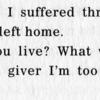1: Text excerpt, Anzia Yezierska’s "Bread Givers," 1925.
In this short excerpt from the novel, Sara Smolinsky, who has recently run away from her parents determined to make a life on her own, visits her married sister Mashah who bemoans her own life of poverty and domestic obligations.
Suggested Activity: Before students begin the novel, ask them to hypothesize about what the title Bread Givers might refer to. Tell them to make note, as they read, of the references to this term in the book (and warn them that there aren’t many).
Once students have read the novel, or have at least finished Book I, ask them to reflect on what they think the term “bread givers” means. How is it similar to or different from—in meaning, tone, or resonance—the more familiar term “bread winner”? What are the various meanings of “bread” throughout the novel—where do actual (edible) bread and money appear? How are the two (bread and money) interrelated? Ask students to reflect on why Chapter 9 is titled “Bread Givers.” Is the title supposed to be descriptive of Sara’s sisters’ husbands? Is it ironic?
Finally, for an extended discussion, ask students to think about other monikers that Yezierska’s characters apply to each other: e.g., Bessie is the “burden bearer,” Sara is “Blut-und-Eisen.” Read aloud some of the instances where these terms are used and ask students: how do these terms function in the story? What do they add to our understanding of the characters who use them and to the characters to whom they are applied? Can you think of instances in real life, or in other pieces of literature, in which people are given a name or title that describes their role? What might be the effects of having such names applied?
Source: Anzia Yezierska, Bread Givers (New York: Persea, 2003), 147.
Bread_Givers_147_excerpt.jpg
 Download image (251.98 KB)
Download image (251.98 KB)

